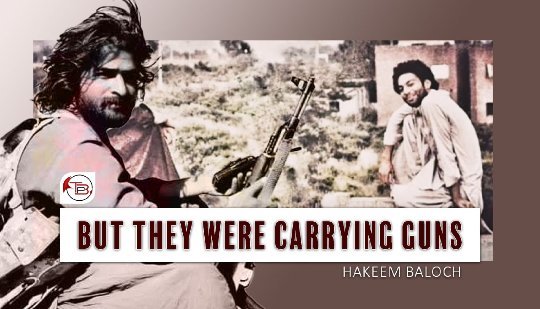Recently Urban Dictionary termed Rapistan as Synonym for Pakistan. A twitter user @pk_msra66 when queried Urban Dictionary, he got the new definition of Rapistan. As per the recent definition, “Rapistan is Synonym for Pakistan. In Pakistan the females of different ethnic groups of Baloch, Pashtun, Mohajirs, Sindhis, and different Religions i.e. Christian, Hindus, Sikhs are regularly raped by the Punjabi Radical Islamists. Pakistan Muslim Grooming Gangs in UK are world famous for raping girls as young as 8-12 years. Pakistan uses rape as a mean of expressing their supremacy on minority ethnic groups and minority religions.”

A user GlobalNatizen had defined the word Rapistan which was accepted and published by a board of reviewers of Urban Dictionary. His definitions on Urban Dictionary can be seen here.
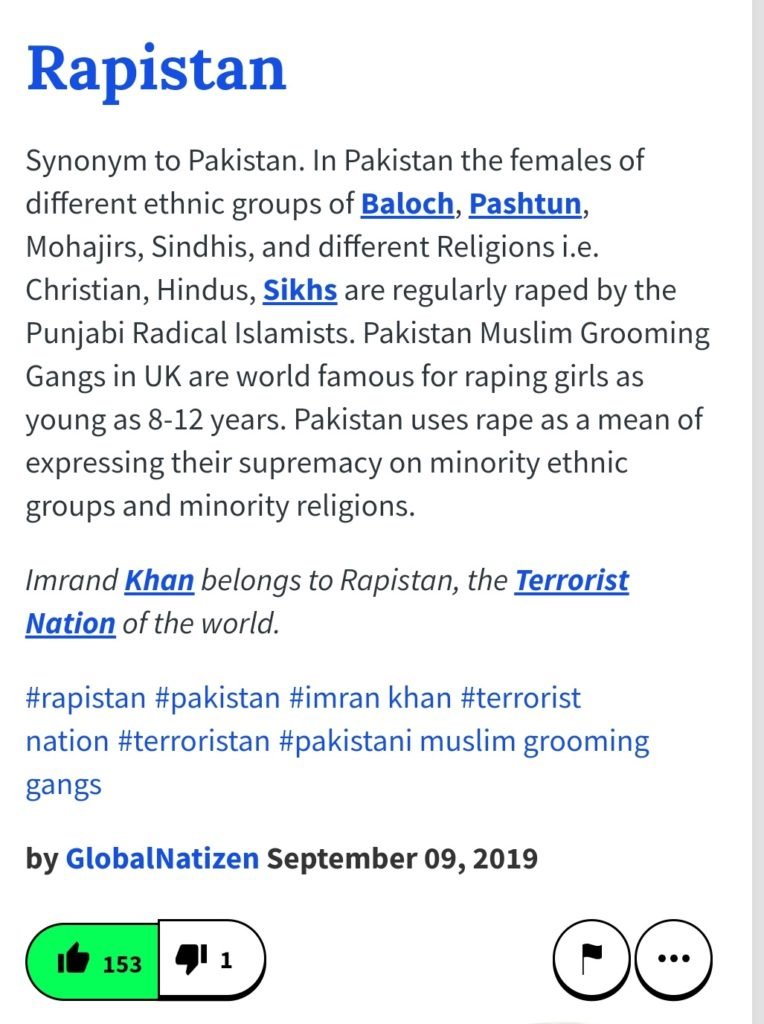
After an article was published by the Main Stream Media channel News 18 showing the wrong definition of “Rapistan”, there was a lot of public condemnation of News18 channel which could randomly pick any stray definition posted on a crowd sourcing site by Pakistanis.
An Indian person we contacted said, “Kya chutia channel hai, no shame in showing the ranting of Pakistanis as News headlines? We don’t need enemies as long as we have such traitors to do malicious propaganda against India.”
Because of the Conscious Indian public uproar, mistake was corrected and News18 definition was removed and a correct definition was posted.
To understand the culture of rape in Rapistan, we need to look into the history of Pakistan right from the time of Partition when Pakistan was born.
Kidnapping and Rapes during Partition
During the Partition of India, violence against women was an extensive issue. It is estimated that during the partition between 75,000 and 100,000 women were kidnapped and raped. Systematic violence against women started in March 1947 in Rawalpindi district where Sikh women were targeted by Muslim mobs. For details of horrific nightmare of the events of 93 Sikh women by jumping in a well, read the article titled Mass Suicide by Women of Rawalpindi in 1947

Violence was also perpetrated on an organized basis, with Pathans taking Hindu and Sikh women from refugee trains. The Pathans abducted a large number of non-Muslim women from Kashmir also and sold them in West Punjab and these sold women often ended up as ‘slave girls’ in factories.

Numerous Hindu and Sikh villages were wiped out. Huge numbers of Hindus and Sikhs were killed, forcibly converted, children were kidnapped and women were abducted and raped publicly. The official figure of death in Rawalpindi stood at 2,263. Before further attacks many Sikh women committed suicide by jumping in water wells to save honour and avoid conversion.
Pakistan Army Rape of Bangladeshi women during 1971
During the 1971 Bangladesh war for independence, members of the Pakistani military raped between 200,000 and 400,000 Bangladeshi women and girls in a systematic campaign of genocidal rape. During the war, a fatwa in Pakistan declared that the Bengali freedom fighters were “Hindus” and that their women could be taken as the “booty of war”. Imams and Muslim religious leaders publicly declared that the Bengali women were gonimoter maal (war booty) and thus they openly supported the rape of Bengali women by the Pakistani Army.
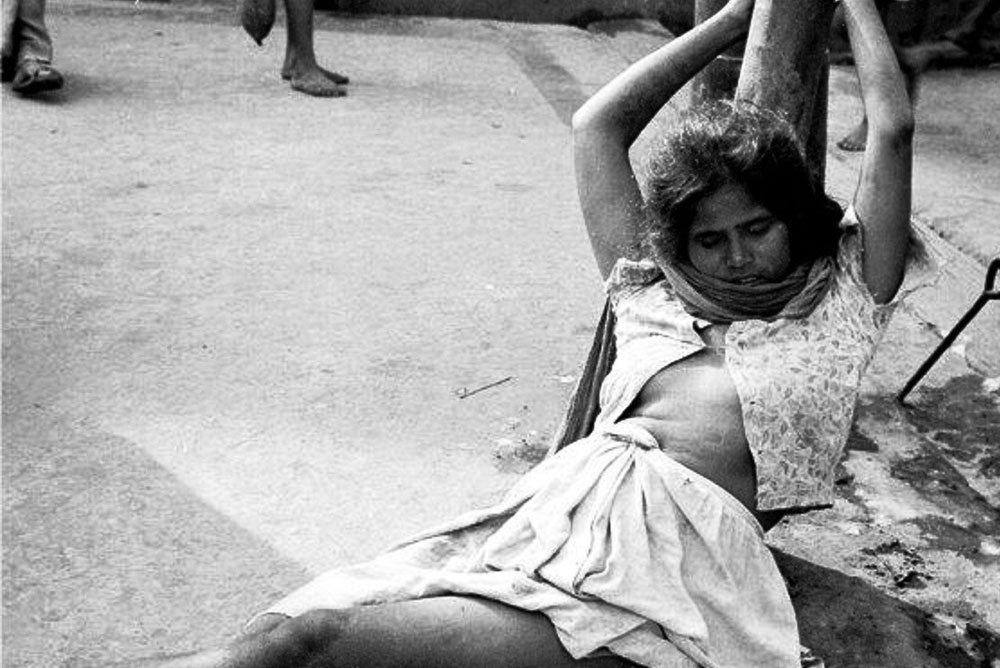
The activists and leaders of Islamic parties were also involved in the rapes and abduction of women. Scholars have suggested that rape was used to terrorize both the Bengali-speaking Muslim majority and the Hindu minority of Bangladesh. The rapes caused thousands of pregnancies, births of war babies, abortions, infanticide, suicide, and ostracization of the victims. Recognized as one of the major occurrences of war crimes anywhere.

In December 1970, in Dacca following the election with victory of East Pakistan’s Awami League, headed by Sheikh Mujibur Rahman, a general said “Don’t worry, we will not allow these black bastards to rule over us”. Soon President Yahya Khan banned the Awami League and declared martial law in East Pakistan.
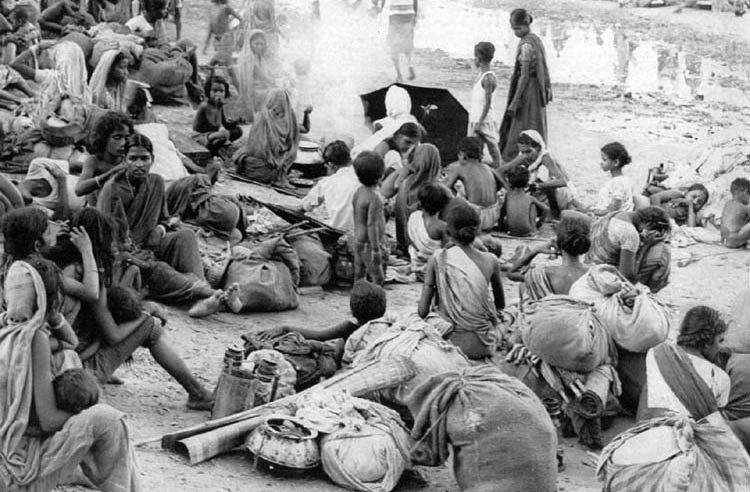
With the goal of putting down Bengali nationalism, the Pakistan Army launched Operation Searchlight on 25 March 1971. According to Eric Heinze the Pakistani forces targeted both Hindus and Bengali-speaking Muslims. In the ensuing 1971 Bangladesh genocide, the army caused the deaths of up to 3 million people, created up to 10 million refugees who fled to India, and displaced a further 30 million within East Pakistan.
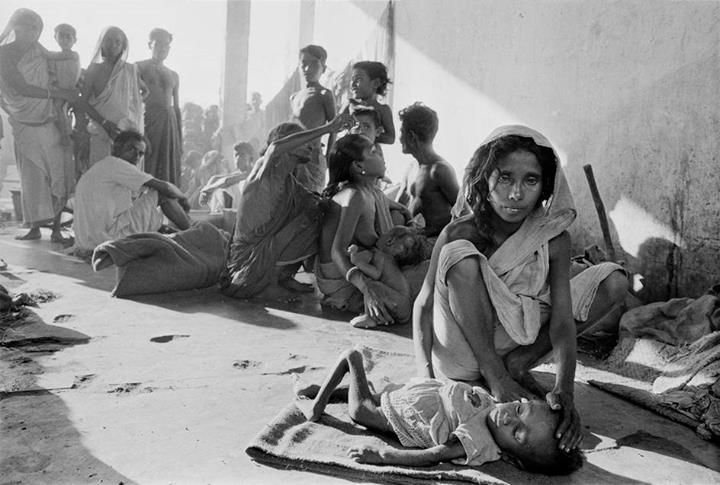
Honour Killing of Females in Pakistan
Since 2000, various women and teenage girls have begun to speak out after being sexually assaulted. Going against the tradition that a woman should suffer in silence, they have lobbied news outlets and politicians. A report from the Human Rights Commission of Pakistan estimated that in 2009, 46 percent of unlawful female killings in Pakistan were “honour killings”.
It should be noted that there is a tradition of honour killing in Pakistan wherein any female who says she was kidnapped and gang-raped faces a threat. As per the tradition, the tribal elders declare her kari, (which literally means black female), for losing her virginity outside marriage.
In tribal areas in Pakistan, women and men who have illicit relationships or women who lose their virginity before marriage are at risk of paying with their lives.
“These are matters of honor and the leaders call a jirga and they declare that the woman or the couple should be killed,” said Abdul Hai, a veteran field officer for the Human Rights Commission in Pakistan. These acts of violence are most commonly labeled as “honor killings.”
In 2002, 30-year-old Mukhtaran Bibi (Mukhtār Mā’ī) was gang raped on the orders of the village council as an “honour rape” after allegations that her 12-year-old brother had had sexual relations with a woman from a higher caste. Although custom would expect her to commit suicide after being raped, Mukhtaran spoke up, and pursued the case, which was picked up by both domestic and international media.
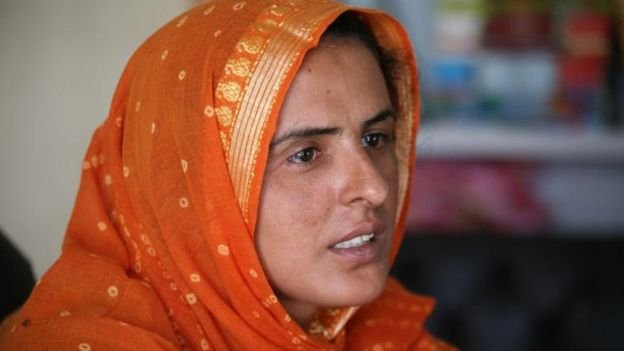
On 1 September 2002, an anti-terrorism court sentenced 6 men (including the 4 rapists) to death for rape. In 2005, the Lahore High Court cited “insufficient evidence” and acquitted 5 of the 6 convicted and commuted the punishment for the sixth man to a life sentence. Mukhtaran and the government appealed this decision, and the Supreme Court suspended the acquittal and held appeal hearings. In 2011, the Supreme Court too acquitted the accused.
Reaction from Shameless leaders who blame victims
In an editorial, Pakistan’s Dawn newspaper wrote that “the rape has drawn the usual reactions.” And to a large extent, this is true. There are countless cases of rape victims committing suicide after losing hope for justice in Pakistan; there are just as many cases of people, mostly men, in positions of religious or political privilege indulging in victim blaming. In 2005, Pakistan’s then-President Pervez Musharraf told The Washington Post, “If you want to go abroad and get a visa for Canada or citizenship and be a millionaire, get yourself raped,” implying that Pakistani women were using being sexually assaulted as a means to get rich and obtain asylum in a Western country.
Mai applied for a visa to leave Pakistan and go to the United States. But in 2005, she was denied. Pakistani President Pervez Musharraf implied at the time that Mai was just using her rape to get rich.
“You must understand the environment in Pakistan,” he said on tape, but nonetheless later tried to deny. “This has become a money-making concern. A lot of people say if you want to go abroad and get a visa for Canada or citizenship and be a millionaire, get yourself raped. It’s the easiest way of doing it.”
Extent of Rape problem in Punjab province in Pakistan alone
As per an article published in Dawn on January 12, 2016 (https://www.dawn.com/news/1232426) Pakistan Tehreek-i-Insaf (Current Ruling party lead by Imran Khan) Punjab organizer Chaudhry Sarwar says the PML-N government has failed to control rape and kidnap cases, claiming that Pakistan is among the 10 worst countries when it comes to rape cases.
He issued a “fact sheet” on the rape and kidnap incidents, stating 14,850 kidnap cases involving women, children and girls were reported in Punjab during the last one year. He said some 2,000 women were kidnapped and 80% of them were allegedly raped during last year while 15% were killed. He said 980 minors were kidnapped, including the newborns from hospitals.
Stating that the incidents of kidnap and rape of women and children were continuously rising, Mr Sarwar observed the Punjab government had failed to protect the lives and property of the masses.
The fact sheet said some 96 kidnaps for ransom cases, including 25 of minors, were registered. In Lahore, the fact sheet said, 15 cases of kidnap for ransom were reported and many of those kidnapped were also killed.
On the other hand, the fact sheet said police’s performance remained unimpressive as they failed to solve hundreds of cases and many of the kidnapped persons were never recovered as some 3,100 cases were still under investigation.
Chaudhry Sarwar said police were only registering missing reports instead of kidnappings to save their skin.
The fact sheet said that the cases of molestation against children were also increasing while the police and other institutions were unable to check such incidents.
Rapes cases in Pakistan
In September 2005, A 23-year-old woman made public accusations against police, saying she was gang raped by 4 policemen in Rawalpindi. Her husband had been arrested for creating forged documents. She was supposedly punished for failing to pay a bribe of 100,000 rupees ($1,674) demanded by the police for the release of her husband. The woman said the policemen barged into her house, locked her husband and uncle in a room and raped her. The officer was suspended but not arrested.
A week before that, a married woman with two children in Karachi said she had been gang raped by four local men but a jirga prevented her from reporting the matter to the police. Instead, the jirga members imposed a fine of 150,000 rupees ($2,500) on the accused. Even that money never reached her.
In 2006, Kainat Soomro’s famous case, she a 13-year-old schoolgirl when she was kidnapped and gang raped for four days. Her protest has led to the murder of her brother, a death sentence from the elders of her village, and threats from the rapists, who after four years still remain at large.
Shazia Khalid, a medical doctor was raped in Balochistan in the ruling of Pervez Musharaf.
In 2012, three members of the Border Police were remanded into custody for raping five women aged between fifteen and twenty-one. The women claim they were taken from a picnic area to the police station in Dera Ghazi Khan, where the police filmed themselves sexually assaulting the women.
In January 2014, a village council ordered gang-rape that was carried out in the same Muzaffargarh district where the Mukhtaran Bibi took place in 2002.
In the 2014 Layyah rape murder incident, on 19 June 2014, a 21-year-old woman was gang raped and murdered in Layyah district, Punjab province of Pakistan.[20]
In September 2014, three sons of Mian Farooq, a ruling party parliamentarian from Faisalabad, were accused of abducting and gang raping of a teenage girl. The rapists were later released by the court.
In July 2017, a panchayat ordered rape of a 16-year-old girl in Multan as punishment for her brother’s conduct.
In December 2017, a 25-year-old girl was gang-raped by four dacoits during a robbery at her house in Multan.
In December 2017, A girl who married against the wishes of her family was allegedly raped by influential members of a panchayat.
in 2019, a 21-year-old girl was raped by three police officers in Rawalpindi. Whereas, across the globe police are responsible for maintaining public order and safety, enforcing the law, and preventing, detecting, and investigating criminal activities, eminently considered as a protector of the citizens. So when the protectors of the citizens are indulged in criminality than from whom one should go for help in an emergency or ask for justice? The sluggish Police attitude and police station system discourage and discomfort the victim from bringing their matter to the courts.
Currently, in 2019 young 10-year-old girl called “Farishta” was raped and strangled to death. Child sexual abuse is becoming universal and prevalent in Pakistan. Recent statistics compiled by the Punjab commission on the status of women are terrifying. According to them from 2014 to 2017, 10,000 rape cases were reported in Punjab, whereas the data collected by a news agency, it states that 2,699 were raped in 2014, 2509 in 2015, 2938 in 2016 and 1,365 in 2107.
Epidemic of Rape in Kosur that shook the world
Kasur was hit by revelations in August 2015 that a pedophile ring based in a nearby village had filmed about 280 children being sexually exploited. After one of the victims went public with a video, investigators found that parents who learned of the crimes had stayed silent to avoid bringing shame on their families in conservative Pakistan, where sex and rape are taboo subjects.
“Before 2015, police used to refuse to register rape cases and often blamed the families, discouraging them” from even filing reports, said Jawad Bukhari, 40, chief executive of Alpha Foundation, a child rights advocacy group in Kasur.
That case helped bring child sexual exploitation to light in Pakistan but did little to curb the problem. The independent Human Rights Commission of Pakistan said that 1,582 rape cases were reported in 2016, more than twice the year before, with child rape cases rising by 10%.
“Child pornography is readily available in CD shops” in Kasur, said lawyer Mohmmad Waqas. “Videos from the 2015 scandal are still in markets. The parents whose children were taped … were silenced by the powerful people in the area.
“In such a situation where government shuts its eyes, crimes against children continue with impunity,” he charged.
7-year-old Zainab rape and murder case
As per an article published on Feb. 1, 2018 in USA Today:-
Child sexual abuse is rampant in this conservative Muslim nation, but it has rarely been addressed openly. Now, the brutal rape and murder of a 7-year-old girl this month is fueling demands for actions to punish predator.
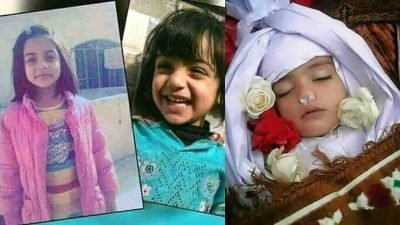
The heinous crime against first-grader Zainab Ansari has triggered nationwide protests and proposed legislation to hold public executions for those convicted of raping children younger than 14.
This city was dubbed the “child abuse capital” of Pakistan after a 2015 scandal over the discovery of hundreds of video clips showing 285 children, mostly boys, being sexually abused. Authorities released the men implicated in the videos.
“Zainab’s death has opened the debate on child abuse to Pakistan’s public, in media and social media, in a huge way,” said Nadia Jamil, an actress and philanthropist who is among high-profile Pakistanis speaking out since the girl’s body was found in a garbage dump on Jan. 5.

Zainab’s body was found a day after she went missing. An autopsy report confirmed she was raped, sodomized and strangled. On Jan. 23, police said they arrested Mohammed Imran, 24, who confessed to luring Zainab with food and killing her and at least seven other girls. Police said he could have been involved in a child pornography ring.

Anger over inaction by authorities erupted into protests that resulted in two deaths on Jan. 10, when police fired into a crowd. A #JusticeForZainab social media campaign has spread, and 80,000 people have signed a petition on Change.org to hang child abusers.
Two months before Zainab’s killing, a girl named Kainat was attacked and dumped in the trash in Kasur. She was the only one of the 12 child victims to survive, but family members say she is disoriented, does not recognize them and cannot speak.
Mohammad Asif, a fruit seller, said it was only after Zainab’s death that the family received a forensic report in the rape and killing of his daughter, 5-year-old Ayesha, who was taken from a wedding in January 2017.
“For one year, I made trips to the police station, but they kept telling me that I should look for the culprit within my own family and surroundings,” Asif said.
“If the police had done their job in the previous cases, my Ayesha would have been saved. Or if they would have done their job in Ayesha’s case, Zainab would have been saved.”
Sajid Ali, a spokesman for the district police, acknowledged that the police in the past had “mistakenly caught the wrong culprits” in the child rape cases. Some were killed in “encounters,” a term used to describe police killings in self-defense, Ali said.
Sahil, an activist group fighting child sexual abuse since 1996, tallied more than 720 incidents in Kasur in the past three years. It lists 12 reports of abuse just this month in the neighborhood where Zainab’s body was found.
“These incidents are a result of not punishing those who were part of the larger incident reported in 2015,” said Samar Minallah Khan, a documentary filmmaker based in the capital, Islamabad. She said the government ignores the problem because child pornography generates so much revenue.
“How come we have acceptance for this kind of content being distributed openly?” she asked. “It’s probably a big thriving business.”
Khan said victims often don’t come forward because they are often blamed for attracting predators. However, Zainab’s death is prompting many to speak out.
Zainab’s death also has led to pressure on schools to do more to protect children. “There are widespread calls for sex education in schools and awareness programs for children, parents, teachers,” said Rubina Saigol, a human rights activist in Lahore. “In the past, sex education was berated as obscenity and a shameful idea. People were in denial. They used to say, ‘This doesn’t happen in an Islamic society.’”
Muslims accused of raping Christian teenager in Pakistan
Crimes against religious minorities in Pakistan are increasing as culprits escape justice.
We covered about attacks, forceful abduction girls from religious minorities of Christians and Hindus, forceful conversion to Islam and forcefully marrying to Islamist Radicals in Pakistan in details in a couple of our previous articles
Pakistan A Living Hell For Christians. But Takes Foreign Aid From Christian Countries.
Christian And Hindus Face Blasphemy Laws, Acid Attacks, Forcefully Converted To Islam In Pakistan
In a recent article published on June 18, 2019 in ucanews, A poor Christian family in Pakistan are demanding justice after their teenage daughter was allegedly raped by five Muslims.
Maria, 15, was kidnapped from her house in Sheikhupura city of Punjab province on June 9 while her father Jalal Masih was out working as a laborer.
Masih accused local businessman Muhammad Sajid and four other men in a first information report (FIR) filed at a police station.
“The locals saw them abducting her at gunpoint in a vehicle. I reached his [Sajid’s] office but he was absent. We made contact the next day and he threatened to return her dead body if we informed the police,” Masih said in the FIR filed six days after the incident.
“Sajid escaped after leaving Maria on our doorstep on June 10 night. She was extremely scared.”
Christian activists are demanding the arrest of the culprits as the news spreads on social media.
According to Legal Evangelical Association Development (LEAD), a non-profit advocacy group providing legal aid to persecuted minorities, 28 Christian girls became victims of abduction, torture, sexual harassment, rape, forced conversion and forced marriages in Pakistan from November 2018 to June 2019.
“The number of unreported cases will be higher as the families of victims usually avoid getting help from biased police officials who support cruel and influential culprits. Only Christian and Hindu girls are victims in such cases. Crimes against religious minorities are increasing at a high scale in Pakistan,” LEAD national director Sardar Mushtaq Gill told ucanews.com.
“Most cases are dealt with in a wrong manner because of the bad treatment and attitude in police stations. The victims only become more victimized.
Rape of Baloch, Pashtun, Mohajir, Sindhi, Ahamadiya, Hazara ethnic women
It should be noted that all the documented cases mentioned above were covered by Media from Punjab or Karachi. However there is a very big area of Balochistan 347,190 square kilometres (134,050 sq mi) and Khyber Pakhtunkhwa 101,741 square kilometres (39282 sq mi) which totals 50% of Pakistan area, no news is covered from this large area. There is a total media blackout by Pakistan Army.
Pakistan Army is repeating what it did in 1971 in Bangladesh, in Balochistan and Khyber Pakhtunkhwa. Thousands of Baloch and Pashtun women and girls have been raped. Because of total Media Blackout and Media Censorship and denial by Police to register any cases of Baloch and Pashtun women and girls that are victims of Pakistan Army rapes, the news of these large number of victims does not reach the International Media.
It is worldwide known that Balochistan was a sovereign country that was occupied by Pakistan Army. Pakistan army has disappeared over a million Baloch people, either killed in extra judicial manner or sold in organ harvesting. In an interview, Dr Allah Nazar told about the concentration camps, where the Pakistan Army keeps the common Baloch, including women, children and the aged, in detention and tortured.
In article published in 2016, Balochistan woman exposed Pakistan, claimed that the Pakistan Army have rape cell, where women are confined and subjected to brutal sexual assault.
Pakistan Army is doing it can do to curb the demand for freedom of Baloch people. We covered this in details in our previous article “EXPOSED: Pakistan Army Doing Organ Harvesting After Enforced Disappearance Of Ethnic Baloch, Pashtuns And Muhajirs”
As per an article written by Taha Siddiqui, published in TheQuint, A delegation of well-known women’s rights political activists also visited the Waziristani woman this weekend, to assess the situation on-ground.
They have unearthed similar claims, but not just from the woman. Activists who visited the area and know about the conflict that has engulfed this region since 9/11, say that many other women came forward, and there are many more such cases of sexual abuse by the Pakistan Army, but the women have been reluctant to speak out, partially due to fear, but also for another reason: the concept of honour in a conservative and patriarchal society.
‘Honour codes’ of Pashtun society dictate that women stay silent about the abuse they face, because if they go public with it, it will bring disrepute to their family and they may be killed to “protect the honour”. Thus, the Pashtun women stay quiet about such harassment, abuse, and in some cases, even rape.
One of the activists who visited North Waziristan is Gulalai Ismail, who runs an award-winning NGO called Aware Girls. Ms Ismail has been quite active in advocating for the rights of Pashtuns, the ethnic community she herself belongs to. However Pakistan Army arrested her on Terror charges and put her in Jail.
According to Ismail, the sexual abuse and harassment of women by the Pakistani military in her region has been rampant for many years, but it is the first time that the women are coming forward themselves, and it is mainly because of the Pashtun Tahaffuz Movement which has given the women the courage to speak up.
The PTM, which is a grassroots movement in Pakistan, has emerged in the wake of the extra judicial killings of men from the tribal belt, and other serious grievances against the Pakistani state. The movement has garnered global attention in recent months.
However, despite the PTM taking up the cause of women and children, the subsequent video of the woman going viral, and the visit of the women’s delegation to the tribal belt, the Pakistani media has remained silent about these serious allegations of soldiers committing sexual abuse in the name of raids. Apparently, journalists have been told by the ISPR, the media-wing of the Pakistan military, to not cover the PTM or anything related to it.
Reports of Alleged Rape by Pak Army Not Only From Khyber Pakhtunkhwa
In another recent video by a political activist from the Swat Valley (to which Nobel Laureate Malala Yousafzai belongs), a local claimed that over a thousand of women were abducted by the military while conducting operations in his region. Local women’s rights activists agree with this assessment, but once again, the cases are almost never documented, because the families of such victims do not come forward due to fear of the powerful Pakistan Army, and the ‘honour code’.
Earlier, in Balochistan, similar reports had emerged, including the well-known case of Dr Shazia Khalid, who was allegedly raped by a Pakistan Army officer in 2005, in Balochistan. Justice was never served in her case, and instead Dr Khalid had to subsequently leave Pakistan with her family, amidst threats to her life.
Pakistan Army use rape as a weapon in conflict zones like Balochistan, Khyber Pakhtunkhwa and the tribal belt. It may not be a policy, but it is no secret that dozens of women in East Pakistan were kept in rape camps managed by the Pakistan Army during the civil conflict that led to the division of the country, and the creation of Bangladesh in 1971.
Role of Movies and Dramas in Pakistan to mitigate the crime of Rape
There is no such thing as ‘romanticism’ when it comes to rape. It is the foulest act a human can commit. Yet, dramas in the past, such as Sangat, have had the tendency to sensationalize and mitigate the crime by portraying the character of the rapist as a ‘decent’ human being who just happened to ‘slip’ and commit sexual assault.
This is a serious issue of giving a rapist the stance of a ‘hero’ not condemned by Pakistan government. Given the rise in cases of rape and harassment in Pakistan, Pakistan government does not take note of the kind of content, the dramas their industry is producing. No line is drawn between telling an inspiring story and commercializing a crime.
Stockholm syndrome exists for a reason. Empathizing with your rapist is not normal and should be shown just as that.
Lack of government action against such absurd ideologies, Pakistan society will be conditioned to think that rape can be validated as a ‘mistake’ rather than a vile crime.
Follow us at:-
Twitter Handle: @communique_news
Parler Handle: @newscommuniquecom
Visit our :
YouTube Channel
Facebook Page






